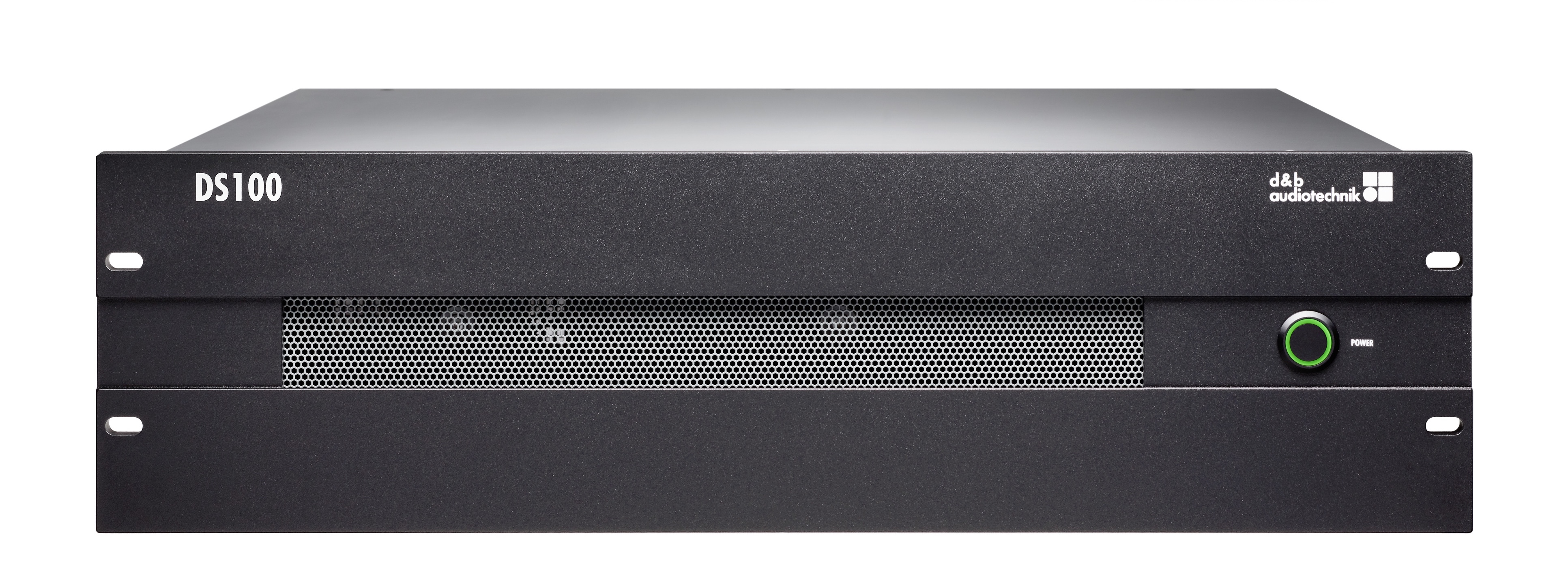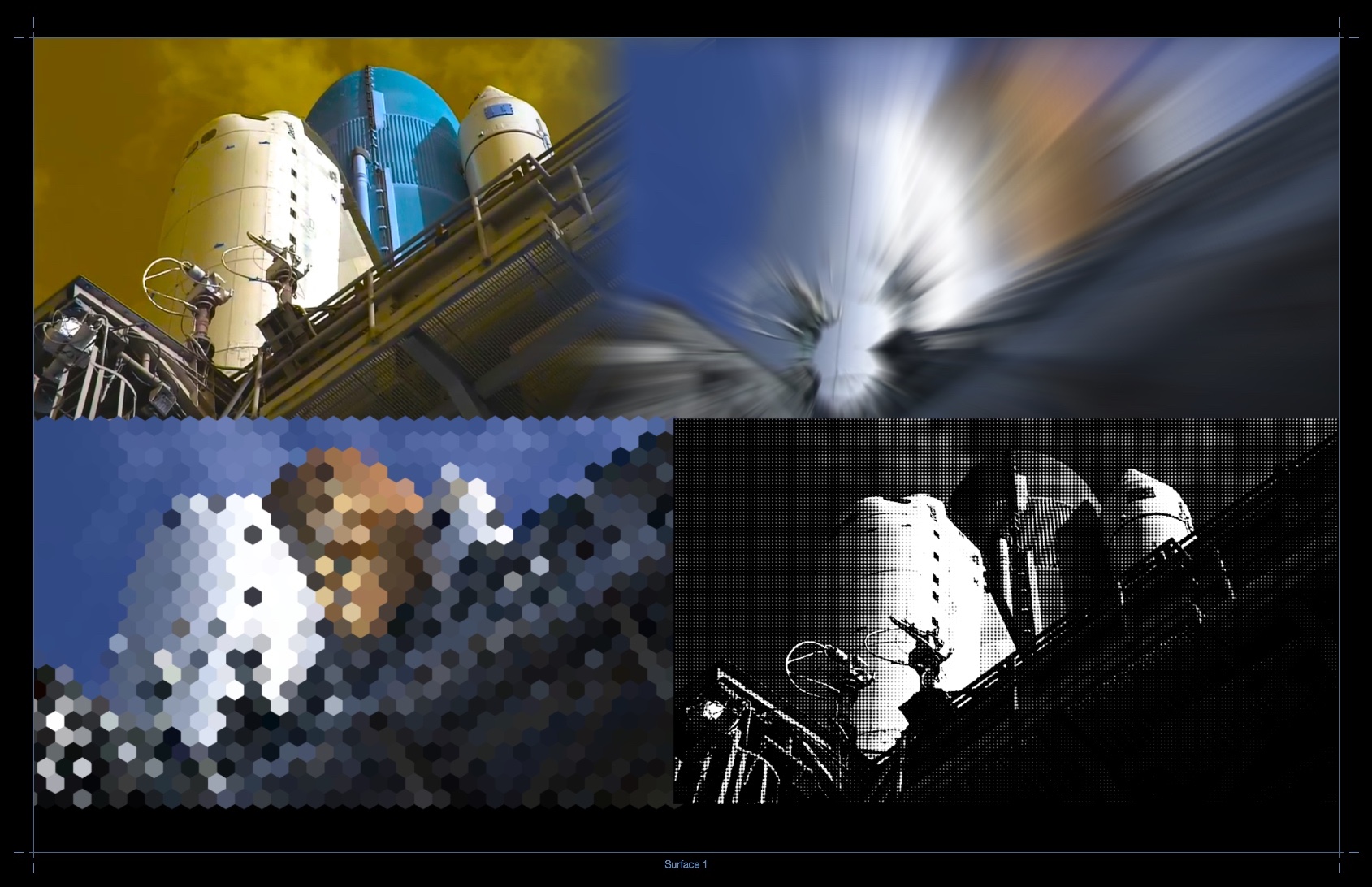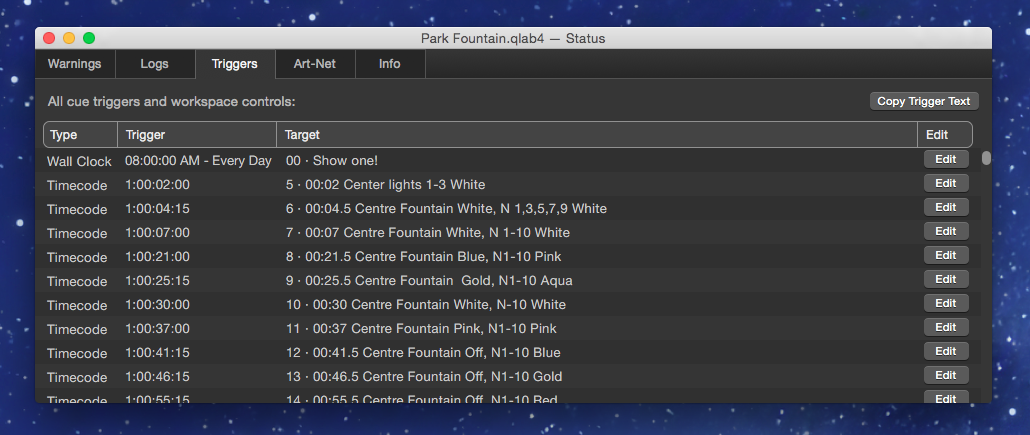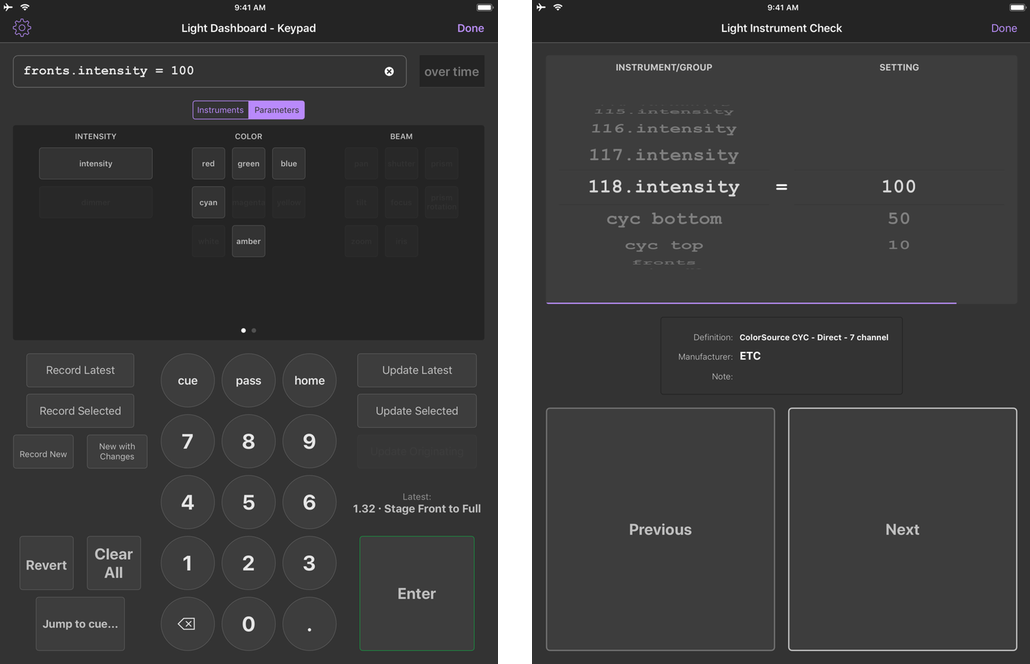Announcing QLab 4.2
Hello again! It's time for another big QLab update!
QLab 4.2 brings a slew of new features, all free for v4 license-holders. We're also introducing some exciting lighting features to QLab Remote, and making a basic "view-only" version of QLab Remote FREE. Here are the highlights:
Batch Edit Audio Levels
Hooray! You can now batch-edit audio levels and audio trim in the Audio and Video cue inspectors. We're thrilled to deploy this long-requested feature.
d&b Soundscape Integration
With 4.2 we're introducing a new mode for Network cues to integrate with the new Soundscape DS100 Signal Engine from d&b audiotechnik. The DS100 is a 64x64 channel signal processing system, featuring flexible routing and DSP, spatial positioning of sound, and acoustic emulation. You can enable DS100 mode for Network cues in the network workspaces settings.

Better Video Performance
We’ve spent a lot of time under the hood improving video performance for 4.2.
The most significant optimizations are for video effects; the video effects pipeline has been rewritten from the ground up, dramatically improving performance by utilizing GPU acceleration.
We've also made a series of other adjustments to improve performance when animating videos with Fade cues, or playing back videos that contain an audio track.

Perma-Surface
Video surfaces can now be set to render a "permanent" black background between cues, ensuring a smoother start for the next Video cue. Screens assigned to surfaces with this setting will continue rendering until a panic.
Review All Your Triggers in One Place
A Triggers tab to the Workspace Status window, where you can review all cue triggers and workspace controls. You can also copy this information as text to export it to an external text editor or spreadsheet.

Light Dashboard Improvements
The Light Dashboard now includes these new functions:
- Update Selected Cue(s) - Saves edited levels into the currently selected Light cue(s).
- Record All to Selected Cue(s) - Record all levels into the currently selected Light cue(s).
- Record All to Latest Cue - Record all levels into the most recently run Light cue.
- Clear All - Set all instruments to their home values. (aka “Go to blackout.”)
You can also now undo and redo your edits in the Light Dashboard.

Major Improvements to Accessibility
We're very pleased to say that QLab 4.2 inclues major improvements in accessibility for those who are blind or vision-impaired. 4.2 includes:
- much-improved support for screen readers,
- support for high-contrast mode,
- support for differentiating UI elements without color,
- and other improvements.
QLab Remote 4.2
QLab Remote is now free to download and use in "Read-Only Mode", which includes the ability to flag cues and edit cue notes.
Optional In-App Purchases let you disable "Read-Only Mode" and unlock either "editing" or the new "light tools" at any time. (Existing owners of QLab Remote 4.1 and earlier will have the same functionality as before by getting the "Show Control & Editing" purchase auto-unlocked for free.)
When connected to QLab 4.2 or later, QLab Remote now offers new "Light Tools" features, available as an In-App Purchase:
- Dashboard Keypad: an adaptive controller for quick entry of light commands in the QLab Light Dashboard
- Instrument Check: verify your lighting rig by sending test commands to each instrument and group in the Light Patch

And, of course, more
You can read every last detail of the changes in 4.2 in the full change log below.
Happy designing!
QLab 4.2 Release Notes
★ Stars denote major new features.
Workflow Changes
Improvements to accessibility, via:
- much-improved support for screen readers,
- support for high-contrast mode,
- support for differentiating UI elements without color,
- and other improvements.
A Triggers tab to the Workspace Status window, where you can review all cue triggers and workspace controls. You can also copy this information as text to export it to an external text editor or spreadsheet.
You can now hold down the option key when dragging cues within a list or cart to duplicate them rather than move them.
If you have chosen to show the Launcher window at launch, it will now also be shown if you close all open workspace windows.
The playhead can now be unset via OSC by sending "none" to the Workspace
or Group cue OSC commands "/playheadId" and "/playbackPositionId".
You can now move the playhead on a Cue List with the OSC commands:
/cue/{number}/playhead/next/cue/{number}/playhead/previous
Fade Cue OSC methods:
/rotationto get/set a single-axis rotation value, i.e. X rotation, Y rotation, or Z rotation./cue/{cue_number}/translation {number_x} {number_y}/cue/{cue_number}/scale {number_x} {number_y}
You can now set the messaging rate (in FPS) of custom OSC messages in the Network cue.
Improvements to the 2D fade path of the Network cue:
- You can now scale, drag, and delete individual points of a 2D fade path, as well as the path as a whole.
- The mouse coordinates are displayed when editing the 2D fade path.
The "Stop Selected" commands in the MIDI Controls and OSC Controls workspace settings are now "Panic Selected" commands.
When creating new cue lists or cue carts, the new list or cart will be inserted under the current selection in the right panel.
Independent cue list windows will now respect the small / medium / large cue row preference.
Fade cues are no longer allowed to target Network cues (which have no externally-fadable parameters anyway).
Fade cue OSC methods that update the 3D geometry
(i.e. /rotateX, /rotateY, /rotateZ, and /resetRotation)
now require the rotation type to be set to "3D orientation".
The Fade cue inspector now displays the correct content in the "Video Effects" tab for cues that target Group cues.
The inspector no longer shows audio-related tabs for certain cue configurations that do not support audio, i.e. Fade cues that target Text or Camera cues and Video cues that play a still image.
Several other bugs, some of which prevent crashes.
Audio Changes
A new mode for Network cues to support integration with the new DS100 Soundscape processing engine from d&b audiotechnik. The DS100 is a 64x64 channel signal processing system, featuring flexible routing and DSP, spatial positioning of sound, and acoustic emulation. You can enable DS100 mode for Network cues in the network workspaces settings.
You can now batch-edit audio levels and audio trim in the Audio and Video cue inspectors. (Not yet supported for Mic cues.)
A very brief (~5ms) fade-in that could sometimes affect the beginning of audio playback even when a cue was pre-loaded.
Cues that are in the ghostly tail-out state (when the file has finished playback but something like an audio reverb is still rendering) will now behave better.
Video Changes
Video surfaces can now be set to keep rendering a black background between cues, ensuring a smoother start for the next Video cue. Screens assigned to surfaces with this setting will continue rendering until a panic.
OSC methods to set the live rotation around a specific axis:
/cue/{cue_number}/liveRotation/Xaxis {number}or/cue/{cue_number}/liveRotation/x {number}/cue/{cue_number}/liveRotation/Yaxis {number}or/cue/{cue_number}/liveRotation/y {number}/cue/{cue_number}/liveRotation/Zaxis {number}or/cue/{cue_number}/liveRotation/z {number}
OSC methods to set some video parameters as a 2-argument method, rather than just the previous 1-argument versions:
/cue/{cue_number}/translation {number_x} {number_y}/cue/{cue_number}/liveTranslation {number_x} {number_y}/cue/{cue_number}/scale {number_x} {number_y}/cue/{cue_number}/liveScale {number_x} {number_y}/cue/{cue_number}/origin {number_x} {number_y}
We’ve spent a lot of time under the hood working on improving video performance. Changes include:
- The video effects pipeline has been rewritten from the ground up, dramatically improving performance by utilizing GPU acceleration.
- Video effects no longer entail an undesired shift in color values or gamma response.
- Video effects like blurs are no longer cropped to the original cue dimensions.
- Animating the geometry of Video, Camera, or Text cues using a Fade cue is now smoother.
- Loading to (or past) the end of a Video cue has been optimized, significantly improving performance when “jumping” into the middle of a long sequence of Video cues.
- Video cues that contain an audio track will now play back more smoothly.
A regression that prevented drop shadows in Text cues from working properly.
If the mouse is located on a video surface when the video begins to play, it will now re-appear properly if it is moved to a screen that is not in use as a video surface.
Lighting Changes
New functions in the Light Dashboard:
- Update Selected Cue(s) - Saves edited levels into the currently selected Light cue(s).
- Record All to Selected Cue(s) - Record all levels into the currently selected Light cue(s).
- Record All to Latest Cue - Record all levels into the most recently run Light cue.
- Clear All - Set all instruments to their home values. (aka “Go to blackout.”)
You can now undo/redo your edits in the Light Dashboard.
Support for both universes of DMXKing ultraDMX2 PRO and eDMX2 PRO interfaces.
Support for decimal values in Light cue commands which use percentage values, to allow higher precision.
Light definitions for the following American DJ instruments: Focus Spot One, Focus Spot Two, Focus Spot Three Z, Inno Color Beam Z7, Inno Color Beam Z19, Inno Pocket Spot LZR, Inno Pocket Spot Twins, nno Pocket Wash, Inno Pocket Z5, Inno Spot Pro, Stinger Spot, Vizi Beam 5RX, Vizi Beam RSONE, Vizi BSW 300, Vizi Hex Wash7, Vizi Hybrid 16RX, and Vizi Q Wash7.
Light definitions for the following Chauvet instruments: COLORado M, COLORdash Par-H7 IP, COLORdash Par-H12 IP, Maverick MK Pyxis, Maverick MK1 Spot, Maverick MK2 Profile, Maverick MK3 Wash, Ovation E-260CW or E-260WW, Ovation E-260WW IP, Ovation E-930VW, Ovation F-55FC or F55WW, Ovation F-265WW, Ovation F-910FC, Ovation F-915FC, Ovation F-915VW, Rogue R1X Spot, Rogue R2X Spot, Rogue R3 Spot.
Light definitions for the Clay Paky Axcor Beam 300, Axcor Spot 300, Axcor Wash 300, Axcor Profile 900, K-EYE HCR K10, K20, S10, and S20.
Light definitions for the following Elation instruments: Artiste DaVinci, Chorus Line 8, Chorus Line 16, DARTZ 360, E Spot III, Fuze Wash 575, Fuze Wash Z120, Fuze Wash Z350, Emotion, KL Fresnel 4, KL Fresnel 6, KL Fresnel 8, Platinum Beam 5R Extreme, Platinum FLX, Platinum HFX, Platinum Seven, Platinum Spot III, Platinum Spot LED II, Proteus Beam, Proteus Hybrid, Protron 3K, Protron 3K Color, Rayzor 360Z, Satura Profile, TVL Cyc, TVL Panel DW, TVL Softlight DW, CW Profile HP IP, and WW Profile HP IP.
Light definitions for the following ETC instruments: ColorSource CYC, ColorSource Linear, Selador Desire D40 series, Selador Vivid-11, Vivid-21, Vivid-42, and Vivid-63.
Light definitions for the Martin MAC Encore Performance CLD and WRM, RUSH MH 4 Beam, RUSH MH 10 Beam FX, and RUSH MH 11 Beam.
Light definitions for the following Robe instruments: BMFL Spot, BMFL Wash and Wash XF, BMFL WashBeam and WashBeam EV, BMFL Blade, Cyclone, DigitalSpot 3500 DT, DL4X Spot, DL4S Profile, DL4F Wash, DL7S Profile, DL7F Wash, Dominator 1200 XT, LEDBeam 100, LEDBeam 100 DayLight, LEDBeam 100 SmartWhite, LEDBeam 150, LEDBeam 1000, LEDWash 300, LEDWash 300+, LEDWash 300 SmartWhite, LEDWash 600, LEDWash 600+, LEDWash 800, LEDWash 800 DayLight, LEDWash 800 SmartWhite, LEDWash 1200, MiniMe and MiniMe DV, MMX Spot, MMX WashBeam, MMX Blade, Pointe, MiniPointe, MegaPointe, RoboSpot Motion Camera, Spiider, Spikie, Viva, and Viva CMY.
Light definitions for the Rosco RevoPRO gobo rotator.
Light definitions for the Vari*Lite VL1100 LED and VL1100 LED HP.
16-bit versions of generic RGB, RGBW, and RGBAW fixtures.
QLab will now reset orphaned DMX values to 0 when unpatching instruments in the Light Patch.
QLab will now now re-transmit Art-Net DMX packets every 0.8 seconds, per the recommendation in the latest Art-Net spec. This improves compatibility with some Art-Net receivers.
A bug that prevented certain light commands (like “all = home”) from working properly.
A typo in the light definition for the Martin MAC Axiom Hybrid.
Built-in light definitions have been standardized around using the parameter name “intensity” instead of “dimmer.” Instrument definitions that have been created or saved in existing workspaces will not be changed.
The light definition called “COLORado Solo (1, 2, 3)” has been replaced with a new definition called “COLORado Solo (1, 2, 3, M)” to support the COLORago M. The definition has also been updated to use “intensity” in place of “dimmer” for consistency.
The light definition called “WW Profile” has been replaced with a new definition called “WW Profile or CW Profile HP” to support the CW Profile HP.
Several light definitions for Chauvet Ovation instruments had typo fixes and/or improvements for clarity.